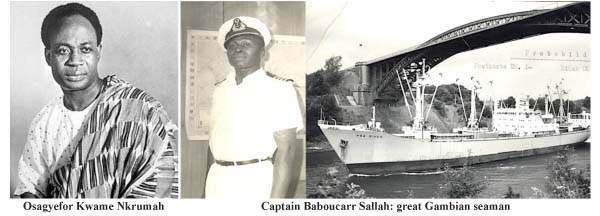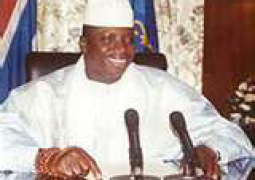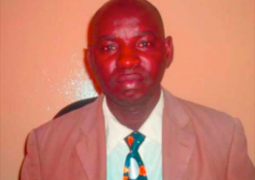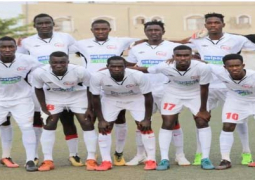
Jahumpa’s initiative
It all started in 1961, when Mr. I. M Garba- Jahumpa, a Gambian nationalist politician, had used his ties with Nkrumah to airlift 100 Gambians, mostly in their teens, to study in Ghanaian secondary schools on scholarship. These were youngsters aged between 13-18 years, who were unable to find a place in the handful of Secondary schools in The Gambia. Jahumpa organised the evacuations without notifying the colonial administration which promoted the government to issue a statement denying any responsibility for the youth’s fate published in Gambia News Bulletin of 23 September 1961.
He did what Tom Mboya did to East African students at about the same time, including the father of the U.S President Barak Obama, which took them to universities in the United States. Today 2015, if Gambians youth prefer to head to Europe, in 1961, it was to Accra.
Destination Accra
By May 1965, there were dozens of Gambian youths studying at various Ghanaian schools including at the Kwame Nkrumah Institute of Pioneering Youth at Teshie. The Accra Evening News of May 20, 1965, ran a photo story showing the visiting Gambian Prime Minister, Jawara, posing with 48 Gambian youths studying in Ghana at the time.
Most of these youngsters stayed in Ghana to achieve professional certificates in public works, agriculture and industry before returning home to work. This number excluded Gambians studying at Ghanaian universities.In 1965, there were 4 Gambian students at the foremost Ghanaian Legon University.
Nkrumah wanted Jahumpa to have a solid corps of youth militants for his party who will help him attain power and steer The Gambia on an Nkruhmahist road after independence. The so-called Gambia Young Pioneers studied Nkrumahism and technical skills. Others completed high schools education which opportunity they did not have in The Gambia.A handful stayed on to attend university in Ghana. Two of them became so close to Nkrumah that even after his overthrow; they stayed with him and ran a spy network for between Conakry and Accra.
Apparently, Ghanaian security was not concerned with the goings and comings of these young Gambians between Conakry and Accra. One of the two was Lamin Janha; he lived with Eric Heyman of the Accra Evening News, while studying in Ghana.The other Gambian ‘spy’ Toranko Jallow was hosted by Nkrumah’s Mother, Nyaninba, before he fled to join Nkrumah in Conakry after the February 1966 coup.
Captain Baboucarr Sallah: great Gambian seaman
Perhaps the best example of a Gambian youth who studied in Ghana under this programme was Baboucarr Sallah, who became a sea pilot and captain.
He was among the first African students to study at the Ghana Nautical College, established in 1958 to develop manpower for the new Black Star Shipping Lines of Ghana.
The College provided courses leading to qualification as officer cadets and by 1959 was graduating 30 qualified sea captains per year. After graduation, Sallah was employed by the Black Star Shipping Lines as the second West African to hold the rank of master in a deep sea sailing vessel, eventually becoming captain of the Black Star Line ship called ‘Mv Prah River’.
The Black Star Shipping Line started with 4 vessels in 1958, and by 1966 when Nkrumah was ousted, its fleet had risen to 18 vessels, including state yachts, linking Ghana with ports throughout the world. Like Ghana Airways, the Black Star Lines helped to project a new image for Ghana and Africa as emerging powers in the world.
The ‘Mv Prah River’ which Captained Sallah piloted, joined the fleet in 1961. Sallah, who now works in the United States, earned a reputation in promoting Nkrumah’s desire to have the Black Star Lines embody the African Personality in international shipping. He was well known to Nkrumah’s ministers and diplomats. His name was cited as an example of Ghana-Gambia ties by the first Ghanaian ambassador to Gambia Dr Peter Foli when he presented his credentials to the Gambian leaders in June 1965.
Nkrumah’s press
In the days leading to 18 February 1965 when The Gambia won her independence from British rule, several Gambian students in Ghana at the time contributed opinion pieces in Nkrumah’s Party Press, all of them quite sanguine about the prospects of the new state especially if it adopted socialism and espoused the African unity project of Nkrumah.
In Nkrumah’s Ghana, the Party Press referred to the Daily Graphic, Evening News, Ghanaian Times, and Spark and towards the end of his regime Sunday Tribune and Mirror, in addition to the State Broadcasting and TV Corporation. All these media outlets were under the strict control of Nkrumah himself and were managed by party zealots such as Eric Heyman, T.D Baffoe and Kofi Batsa.
Rachel Palmer
Rachel Palmer for example contributed a piece from Legon University titled ‘The Gambia is Free Forever... The People Believe in Continental Union Government’. Mrs Palmer (1931-2000) was a leading Gambian nurse and public figure. Her article was reprinted in the Evening News (Accra) ofMay 22, 1965under the apt title ‘Gambia Believes in African Unity’ to mark Jawara’s first official visit to Ghana.Lamin Janha, another Gambian student at Labone Secondary School, rued ‘The Gambia: Only Socialism Will Suit Her’; while M. K Jallow another Gambian student in Accra wrote in the Accra Evening News of February 15 1965 that ‘Union Government will take care of The Gambia, weak economy is no problem’. M.K Jallow (1945-2008), lived in the house of T. D Baffoe, editor of Ghanaian Times under Nkrumah, went onto hold senior positions in the civil service of The Gambia such as Ambassador to the UN.





